|
|
|
Sort Order |
|
|
|
Items / Page
|
|
|
|
|
|
|
| Srl | Item |
| 1 |
ID:
156178


|
|
|
| 2 |
ID:
181531
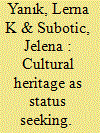

|
|
|
|
|
| Summary/Abstract |
This article explores the relationship between cultural heritage politics and international status-seeking. We advance a two-fold typology of status-seeking that explains why states engage in cultural heritage restoration practices at home and abroad. First, cultural heritage restoration can be an easy way to signal state respect of its multicultural past while providing cover for continuing anti-multicultural policies of the present. States with uncertain, challenged, or liminal international status use cultural heritage projects as a ‘standard of civilization’ of democracy, displaying themselves on the international stage as worthy of status and respect. Cultural heritage here is used as a strategy for international status affirmation. Second, states may engage in cultural heritage restoration beyond their borders, supporting or directly managing renovation of these sites in order to expand their imagined national cultural, political, and economic domain. Cultural heritage restoration projects here serve as a backdrop for powerful international economic alliances that can be used for status substitution—replacing one status-generating benchmark of ‘standard of civilization’ with another—economic prosperity. We illustrate these arguments with two recent cases of cultural heritage restoration that involve Turkey: the ‘Akdamar’ Church in Van, Turkey and the Tomb of Gül Baba in Budapest, Hungary.
|
|
|
|
|
|
|
|
|
|
|
|
|
|
|
|
| 3 |
ID:
118283
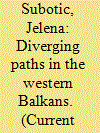

|
|
|
|
|
| Publication |
2013.
|
| Summary/Abstract |
Croatia has bought its ticket to Brussels, and Montenegro could be next, while Serbia, Bosnia, Macedonia, and Kosovo are stuck in a crowded, smoky waiting room.
|
|
|
|
|
|
|
|
|
|
|
|
|
|
|
|
| 4 |
ID:
105877


|
|
|
|
|
| Publication |
2011.
|
| Summary/Abstract |
Why does Europeanization-the process of adopting European rules-advance in some countries, while it stalls in others? What explains different European trajectories of otherwise similar candidate states? This article explains foreign policy choices of EU candidate states with an identity-based theoretical framework. In states where European identity is a widely shared social value, the inevitable short-term costs of Europeanization-economic, social, and political-will still be worth the price of admission because becoming "European" trumps other domestic political concerns. In contrast, in countries where the European idea is not broadly shared, pro-European groups will find it hard to forge crosscutting coalitions needed to successfully promote Europeanization with all its associated costs. To illustrate these theoretical insights, I compare Europeanization in Croatia and Serbia, the two Balkan states with similar regional status, shared legacies of communism, and ethnic war, yet quite different European trajectories. I argue that the process of identity convergence explains Croatia's rapid compliance with controversial EU requirements, while in neighboring Serbia, identity divergence has derailed Serbia's EU candidacy.
|
|
|
|
|
|
|
|
|
|
|
|
|
|
|
|
| 5 |
ID:
107806
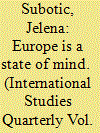

|
|
|
|
|
| Publication |
2011.
|
| Summary/Abstract |
Why does Europeanization-the process of adopting European rules-advance in some countries, while it stalls in others? What explains different European trajectories of otherwise similar candidate states? This article explains foreign policy choices of EU candidate states with an identity-based theoretical framework. In states where European identity is a widely shared social value, the inevitable short-term costs of Europeanization-economic, social, and political-will still be worth the price of admission because becoming "European" trumps other domestic political concerns. In contrast, in countries where the European idea is not broadly shared, pro-European groups will find it hard to forge crosscutting coalitions needed to successfully promote Europeanization with all its associated costs. To illustrate these theoretical insights, I compare Europeanization in Croatia and Serbia, the two Balkan states with similar regional status, shared legacies of communism, and ethnic war, yet quite different European trajectories. I argue that the process of identity convergence explains Croatia's rapid compliance with controversial EU requirements, while in neighboring Serbia, identity divergence has derailed Serbia's EU candidacy.
|
|
|
|
|
|
|
|
|
|
|
|
|
|
|
|
| 6 |
ID:
103713


|
|
|
|
|
| Publication |
2011.
|
| Summary/Abstract |
Over the past two decades, a new international regime of individual criminal accountability has emerged as a dominant regulatory mechanism to address gross human rights violations. At the same time, states are still pursuing claims against each other for human rights abuses in international courts. These two concepts of responsibility - individual and state - are not only fundamentally at odds with one another; they also exclude the third, critical aspect of political accountability - societal responsibility for past violence. This triple accountability - of individual perpetrators who committed the crimes, of the state that hired them to implement the practices, and of society that supported or tacitly approved repressive state policies - is a complex political condition that the current transitional justice framework is ill equipped to deal with. Individualization of accountability serves the retributive purpose of justice, but it is woefully inadequate to address the collective political ideologies that made such heinous crimes possible in the first place. Domestic elites can be enthusiastic supporters of individual human rights trials - not because they want to bring about justice, but because they want to shield the state and society from complicity in past crimes. To address this paradox, this article presents a new framework of post-conflict accountability that includes individual, state, and societal responsibility for human rights violations. The framework is then applied to the case of Serbian responsibility for war crimes committed in Bosnia.
|
|
|
|
|
|
|
|
|
|
|
|
|
|
|
|
| 7 |
ID:
162760
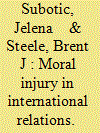

|
|
|
|
|
| Summary/Abstract |
The war in Iraq unleashed disastrous global instability—from the strengthening of Al-Qaeda, to the creation of ISIS, and civil war in Syria accompanied by a massive exodus of refugees. The war in Afghanistan is continuing in perpetuity, with no clear goals or objectives other than the United States’ commitment to its sunk cost. The so-called war on terror is a vague catch-all phrase for a military campaign against moving targets and goalposts, with no end date and no conceivable way to declare victory. The toll of these wars on civilians in Iraq and Afghanistan and elsewhere in the Middle East, on US troops, and on the US economy is staggering. But these ambiguous campaigns are also fundamentally changing US state identity—its view of itself, its role in the world, and its commitment to a liberal international order. They are producing profound anxiety in the US body politic and anxiety in US relationships with other international actors. To understand the sources and consequences of this anxiety, we adopt an ontological security perspective on state identity. We enrich ontological security scholarship by introducing the concept of moral injury and its three main consequences: loss of control, ethical anxiety, and relational harm. We demonstrate how the concept of moral injury illuminates some of the most central anxieties at the core of US identity, offering a new understanding of our global moment of crisis.
|
|
|
|
|
|
|
|
|
|
|
|
|
|
|
|
| 8 |
ID:
148156
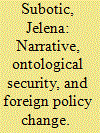

|
|
|
|
|
| Summary/Abstract |
While the recent IR “narrative turn” has greatly improved our understanding of how narratives influence state policy choices, we need to deepen our understanding of how narratives explain policy change. If state “autobiographies” provide such powerful explanations of why states do what they do, how can they change their policies and practices? To understand the relationship between policy change and state narrative continuity, I build on existing scholarship on narrative analysis and ontological security to examine ways in which state autobiographical narratives are used by political actors to confront state insecurities. My principal argument is that at times of great crises and threats to multiple state securities (physical, social, and ontological), narratives are selectively activated to provide a cognitive bridge between policy change that resolves the physical security challenge, while also preserving state ontological security through offering autobiographical continuity, a sense of routine, familiarity, and calm. I illustrate the argument with an analysis of Serbia's changing foreign policy behavior regarding the disputed status of Kosovo.
|
|
|
|
|
|
|
|
|
|
|
|
|
|
|
|
| 9 |
ID:
096214


|
|
|
|
|
| Publication |
2010.
|
| Summary/Abstract |
As a political scientist with expertise in human rights and the Balkans, I was invited to provide critical commentary and analysis of Kosovo's declaration of independence in February 2008 for CNN International. I offered an analysis rooted in the understanding and interpretation of international law, foreign policy, and domestic politics of Serbia and Kosovo. While I was not surprised that my analysis was not popular in Serbia-after all, I did argue that the independence of Kosovo was legitimate-I was surprised at the level of ethnic intensity and the broad-based hostile reaction to my CNN appearance in Serbia. This article first documents the harassment campaign I experienced. I then conduct textual analysis of the hate mail and online postings to offer insights about ethnicity's relation to identity, gender, and political analysis in the public sphere. I conclude by discussing how identities of researchers-as crafted by themselves and others-help define analytical tools we use in scholarly inquiry.
|
|
|
|
|
|
|
|
|
|
|
|
|
|
|
|
| 10 |
ID:
167597
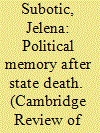

|
|
|
|
|
| Summary/Abstract |
This article explores the relationship between political memory, state ontological security, and populist movements after state death. When a state dies, ideological space opens up for new state agents to narrate a different version of the past, one that delegitimizes the ideological underpinning of the old state order and creates ontological insecurity in the new polity. Populism becomes an especially attractive ideology, as it feeds on a sense of insecurity at home and abroad. The argument is illustrated with the case study of transformed Holocaust remembrance after the death of Yugoslavia. Tracing the history of the Yugoslav memorial exhibition at Auschwitz, the article demonstrates ways in which post-Yugoslav Holocaust remembrance has focused on delegitimizing Yugoslavia’s communist past, especially its antifascism. Once antifascism is removed from state political memory, political space opens up for a revival and ideological normalization of populist—and at its most extreme—fascist ideological movements in the present.
|
|
|
|
|
|
|
|
|
|
|
|
|
|
|
|
| 11 |
ID:
160616


|
|
|
|
|
| Summary/Abstract |
Post-communist states today are dealing with conflicting sources of ontological insecurity. They are anxious to be perceived as fully European by “core” European states, a status that remains fleeting. Being fully European, however, means sharing in the cosmopolitan European narratives of the twentieth century, perhaps the strongest being the narrative of the Holocaust. Influencing the European Union’s own memory politics and legislation in the process, post-communist states have attempted to resolve these insecurities by undergoing a radical revision of their respective Holocaust remembrance where the memory, symbols, and imagery of the Holocaust become appropriated to represent crimes of communism. By rejecting the cosmopolitan European narrative of the Holocaust, post-communist states have also removed anti-fascist resistance from the core memory of the Holocaust, allowing for a revival and ideological normalisation of contemporary fascist ideological movements. I illustrate the argument with an overview of contemporary Holocaust remembrance practices in the EU’s youngest member, Croatia.
|
|
|
|
|
|
|
|
|
|
|
|
|
|
|
|
|
|
|
|
|